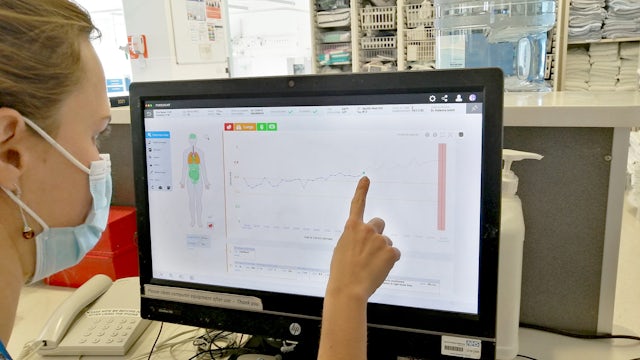
Changing the future of ICU patient care
Dr Samyakh Tukra (MEng 2017) is the founder and CEO of Third Eye Intelligence, which has developed a unique and powerful artificial intelligence (AI). The system gives Intensive Care Unit (ICU) clinicians an early warning of when a patient will develop organ failure.
Dr Samyakh Tukra (MEng 2017) is the founder and CEO of Third Eye Intelligence, which has developed a unique and powerful artificial intelligence (AI). The system gives Intensive Care Unit (ICU) clinicians an early warning of when a patient will develop organ failure.
This technology has the potential to save millions of lives world-wide, as well as making ICU care safer, more efficient, and cost-effective. Sam spoke to us about what inspired him to develop the system, and how his time at Cardiff University shaped his futurebusiness venture.
Sam’s decision to come to Cardiff to study medical engineering was one based on a desire to bring together two of his interests. “At the time I was actually interested in medicine. However, there was a bit of me that still felt unsure whether I wanted to go into pure medicine,” he explained.
“Some of the medical engineering courses at other universities were too focused on biomedical engineering, aimed more towards cellular and biological systems, as opposed to mechanical engineering applied in medicine. I was more interested in the latter, and because Cardiff was one of the only places that offered such a course, I was really drawn towards it.”
While studying in Cardiff, Sam was able to build strong connections with course mates that are still going to this day and has even recently recruited a fellow Cardiff alumnus to the Third Eye team.
It was during his time at Cardiff that Sam began to learn more about AI and how it could be applied in practice. “I remember I went across to the computer science labs and saw a student looking at this webpage. It showed an algorithm, which was basically wires, but it looked like a brain,” he continued. “I realised after looking at it that this was AI. This was real.” It was that fascination with AI which led him to develop Third Eye Intelligence in 2019.
“My inspiration for Third Eye really was my grandfather, who passed away due to organ failure in 2017. After he died, I asked multiple clinicians ‘why is it that you guys didn’t know this was going to happen?’ It didn’t make sense to me, with all that data and information. And I realised that this is the gap in the process. They are recording all this data, but it’s just not humanly possible to process it all in real time and find all the trends.”
“When a patient comes into the critical care unit, they have about five to six days before they’re at risk of organ failure. Which means time is critical.” Sam explained. “They’re hooked up to multiple monitors that are continuously recording data in the background.”
“Our algorithm ingests all that data – live vitals, scans, etc. – and predicts whether one or multiple organs will fail. This way we can give clinicians a longer window of time to intervene, and hopefully change that patient’s fate.”
Processing all this data is no small feat, as Sam explained, “A lot of people don’t know, but in critical care around 253 variables of different datasets or types are constantly being recorded for every patient. That means 253 data points recorded every five-to-ten-minutes, which is a vast amount of data to crunch.”
Sam gave us an overview of the AI and how it measures organ failure probability. “What the algorithm predicts is the potential time the failure will occur and its associated probability.” He elaborated, “probability can only exist between zero and one - one being super confident that something will happen, and zero that it won’t happen at all.”
“So, anything less than 0.5 means the patient is in a normal healthy state, we shouldn’t expect any adverse conditions. But as soon as we go to 0.6, that’s when the risk increases and we raise the first alarm,” Sam told us.
This constant scanning of data leads to alerts being raised for practitioners so they are aware that the patient could be experiencing organ failure. “It’s simply a software beep and it means a nurse or clinician is paged to come and see the patient. That’s the point at which they’re intervening sooner than they would have. That’s the point we’re changing outcomes for patients.”
This ground-breaking technology is what led to Sam being the recipient of a 30(ish) Award in 2022. “To get that appreciation, not just from peers you’re working with but from people you’ve never met before, is a huge validation. It’s something that every founder needs.”
With clinical trials of Third Eye underway, you could soon be hearing about this innovative technology saving lives across the UK, and around the world.




